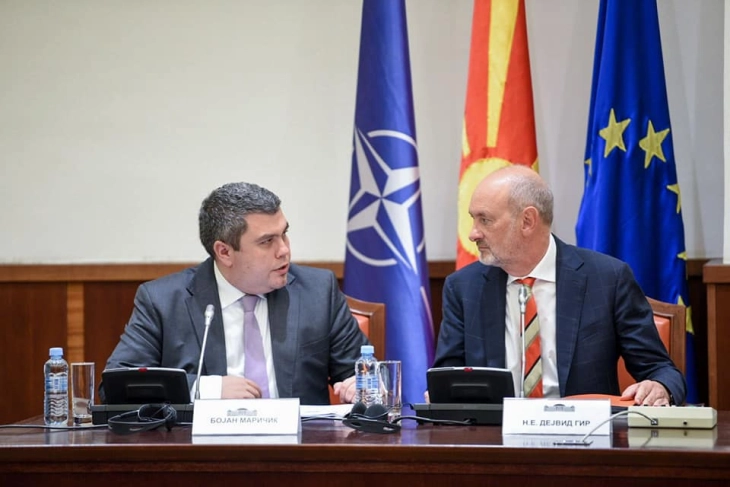Ruling majority, opposition trade accusations over EC country report, non-functional Parliament

Skopje, 31 October 2022 (MIA) - The latest European Commission report on the country no longer serves as an evaluation of the events and a recommendation for improvement, but now more than ever it serves as a manual on how to make progress in the accession process as regards the multitude of reforms required to join the EU, EU Ambassador David Geer said Monday noting the manual is intended for the whole country, all social stakeholders, most importantly for the government and Parliament, which plays a key role in the accession process.
Presenting the EC country report at a joint session of the National Council for European Integration and the Committee for European Affairs, Geer reiterated the assessment on the legislative house included in the report noting its work had been overshadowed by political polarization and good planning and consultation is necessary to limit the use of fast-tracked procedures so as to allow effective oversight and consultations as regards the laws.
According to him, a lot of attention has been paid on these observations given the important role played by Parliament in the EU accession process, adding it is part of growing political polarization that requires all political stakeholders to make efforts to fix it.
Sustainable process, Geer reiterated, can be achieved if reform implementation becomes a national project that involves the government, the opposition, all state institutions, non-governmental organizations and the business community.
"Joint efforts by all political parties is a priority to strengthen the key role of Parliament, a pillar of political dialogue," the Ambassador said.
He announced that the bilateral screening of the country will start on November 11, which is part of the accession process. Some 800 experts from the European Commission will be included.
Deputy Prime Minister for European Affairs Bojan Marichikj, who is also the chief negotiator, reiterated that the EC country report had noted that North Macedonia is partially or well prepared in nearly 90 percent of the areas. The country has maintained the progress dynamic recording improvement in 23 out of 43 areas, whereas a limited or some progress was registered in the remaining 20 areas.
"The government believes North Macedonia should use the momentum and show its full potential by accelerating reforms and with all political forces in Parliament uniting in order to meet the three-decade long goal," Marichikj said.
According to him, only through national consensus and utmost efforts by the government and the administration, the civil society, Parliament, the business and academic community can the country meet its commitment to join the EU by 2030.
Ruling and opposition lawmakers traded accusations as to who is to blame for the report's unfavorable segment involving the functioning of Parliament.
"A party negotiator was appointed, which is the reason behind lack of trust in the EU integration process," VMRO-DPMNE MP Antonio Miloshoski said stressing Parliament has the lowest score in the report compared to the previous four years.
According to him, it demonstrated the declared commitment of the government, which in fact foes nothing to improve the standards in the institutions in Macedonia. Miloshoski accused the ruling majority of weakening the Parliament's position.
Referring to Miloshoski's remarks, SDSM MP Snezana Kalevska Vanchevska said that criticism from the opposition is welcomed, instead of blockades and filibustering. "It does not contribute to better legislation. Parliament should be the arena for real political competition rather than a place where obstacles are made constantly that prevent us from doing our job," she said.
The ruling lawmaker called on everyone to work for a fully functioning Parliament, which is also predictable.
The EC country report, the first one after the opening of the negotiations with the EU on July 19, was also presented to the head of state, the prime minister, the Speaker, the civil society and to the President of the Supreme Court for the first time.







